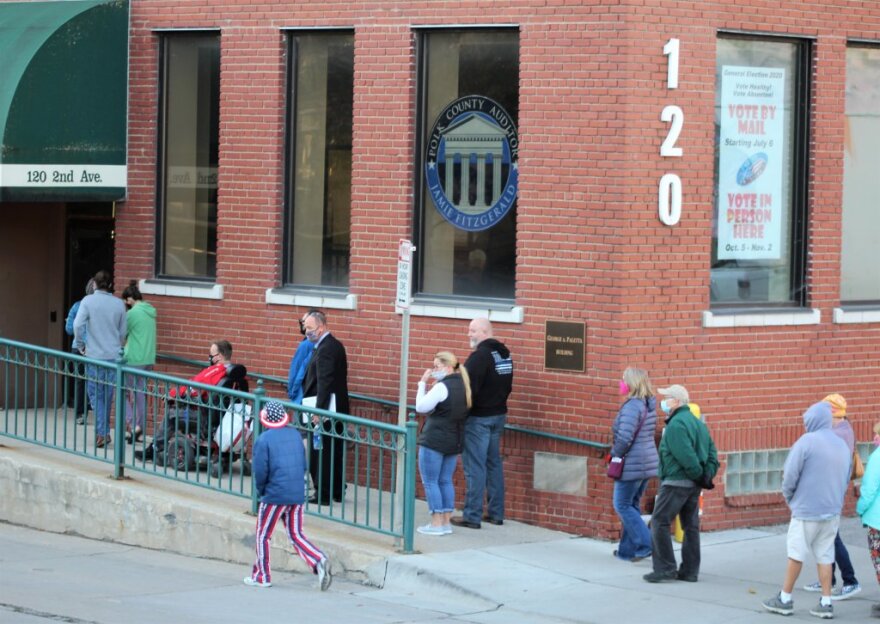Tuesday’s election was the first time Iowa voters went to the polls under a new state election law, passed earlier this year, which imposed new deadlines for absentee ballots, an 8 p.m. cutoff for mail-in voting and more.
County auditors, the elected officials who run the polls, said the new law presented only a few issues in the 2021 election. However, several auditors said the changes did not meaningfully improve Iowa’s process, as Republican lawmakers promised it would, and they raised concerns about the midterms next year.
“Iowa has a really long and excellent tradition of voting, and I’m baffled as to why the changes were made,” said Lucy Martin, a Democrat who serves as the Story County auditor. “It seems to be based on nothing that is happening here.”
Ryan Dokter, the Sioux County auditor, believes the new law did “not necessarily” improve Iowa’s elections process.
“In my opinion, I think it’s an overreaction to the national narrative,” said Dokter, a Republican.
During the 2021 legislative session, Republican lawmakers led the passage of the 29-page bill, which created several changes to Iowa’s voting procedures. In particular, the bill targeted early and absentee voting — shortening mail-in timelines, restricting ballot drop-offs and introducing new rules for satellite locations.
Martin said lawmakers were not responsive when auditors spoke about the law in February, as it moved quickly through the Capitol and to the governor’s desk.
“Nobody listened to anything that any of my colleagues said,” she said. “They wrote the law they wanted to pass.”
Proponents of the bill said that the law was meant to strengthen Iowa’s election laws, building on an already-successful system and increasing voter trust.
“It is my view that government should be run like a business … You look at what you did right, what you did wrong, and you make improvements,” said Rep. Bobby Kaufmann, R-Wilton, upon the passage of the bill in February.
Gov. Kim Reynolds signed the bill into law on March 8. The changes took effect immediately.
Overall, auditors said there were few issues with the changes due to lower turnout in the Nov. 2 election.
Seven county auditors interviewed Friday reported the most issues with the new absentee ballot request timeline. The law changed the deadline for people to request an absentee ballot to 15 days before an election. The previous law allowed absentee ballot requests 10 days before a general election.
“Following that deadline, for the next few days, we had probably a handful of calls of people asking if they could get a ballot mailed to them, and we had to turn them down, obviously,” said Dokter, of Sioux County. “That just speaks to the effort we need to keep making … to get the word out that the deadlines have changed.”
Some of Iowa’s most populous counties experienced a similar issue. Linn County Auditor Joel Miller said about 230 people requested an absentee ballot after the new deadline, but before the previous law’s cut-off.
Polk County Auditor Jamie Fitzgerald reported 193 people who ran into the same issue in Polk County.
“Under the law in 2020, these voters would have received a ballot,” Fitzgerald, a Democrat, said. “Instead, they were contacted … and received a letter from our office saying we can no longer send you a ballot because of the change in the law.”
Marshall County Auditor Nan Benson, a Republican, said her team also struggled to send out the absentee ballots in a shorter timeframe. County auditors can begin sending absentee ballots 20 days before an election — nine fewer days than they had in 2020.
“They probably shortened it up a little too much,” Benson said.
Some counties also ran into a new deadline on the other side of Election Day. Auditors must reject absentee ballots that are delivered after 8 p.m. on Election Day. Previously, the ballots would be valid, as long as they were postmarked by the day before the election.
Polk County rejected 12 late ballots, just four of which would have been eligible in earlier elections. Linn County rejected five ballots due to the election night deadline.
Despite the mostly smooth election on Tuesday, however, auditors raised concerns that the changes could create more severe challenges in higher-turnout elections — like the 2022 midterms, when high-power incumbents like Sen. Chuck Grassley and Gov. Kim Reynolds are on the ticket.
Dokter said that having less time to mail out and collect absentee ballots could present a logistical challenge for his team next year.
“Really, what the timelines do is just truncate everything and probably create more volume on our end for the big elections, to process the same amount of ballots but have less time to do it,” he said.
Fitzgerald raised concerns about the system for satellite early voting sites. Before, county auditors could decide where and when to offer early voting. Now, residents must petition for a satellite early voting site — a system that he worries will create less consistent options for early voters.
“Those people are going to come somewhere. They’re going to come here,” he said, referring to the auditor’s office. Polk County is considering renovations to make the downtown site more accommodating for longer lines and bigger crowds.
Martin, of Story County, and Benson, of Marshall County, both noted that the electorate would also look different next year. People voting in city and school elections tend to be regular, well-informed voters, but a large, general election is likely to draw more first-time people to the ballot box.
Marion County Auditor Jake Grandia, a Republican, said communication would be essential leading up to the 2022 election, as more people vote absentee with the new deadlines. He declined to say whether the election changes were an improvement, emphasizing his job was to follow the law.
“Any changes or anything like that, we’re going to follow the rules and help assist our voters,” he said.




